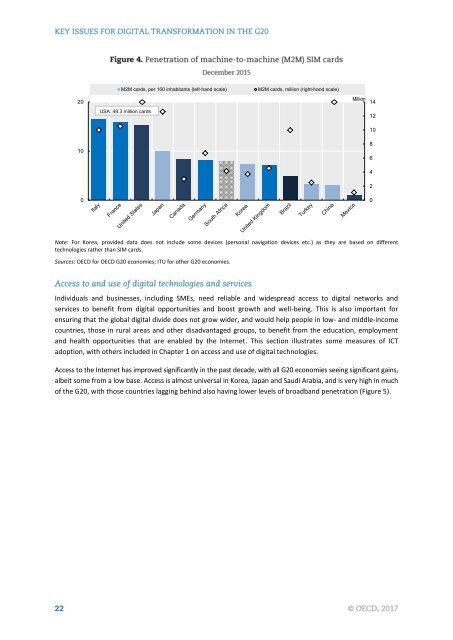KEY ISSUES FOR DIGITAL TRANSFORMATION IN THE G20
2jz0oUm
2jz0oUm
You also want an ePaper? Increase the reach of your titles
YUMPU automatically turns print PDFs into web optimized ePapers that Google loves.
20<br />
10<br />
0<br />
M2M cards, per 100 inhabitants (left-hand scale)<br />
USA: 49.3 million cards<br />
M2M cards, million (right-hand scale)<br />
Million<br />
14<br />
12<br />
10<br />
8<br />
6<br />
4<br />
2<br />
0<br />
Note: For Korea, provided data does not include some devices (personal navigation devices etc.) as they are based on different<br />
technologies rather than SIM cards.<br />
Sources: OECD for OECD <strong>G20</strong> economies; ITU for other <strong>G20</strong> economies.<br />
Individuals and businesses, including SMEs, need reliable and widespread access to digital networks and<br />
services to benefit from digital opportunities and boost growth and well-being. This is also important for<br />
ensuring that the global digital divide does not grow wider, and would help people in low- and middle-income<br />
countries, those in rural areas and other disadvantaged groups, to benefit from the education, employment<br />
and health opportunities that are enabled by the Internet. This section illustrates some measures of ICT<br />
adoption, with others included in Chapter 1 on access and use of digital technologies.<br />
Access to the Internet has improved significantly in the past decade, with all <strong>G20</strong> economies seeing significant gains,<br />
albeit some from a low base. Access is almost universal in Korea, Japan and Saudi Arabia, and is very high in much<br />
of the <strong>G20</strong>, with those countries lagging behind also having lower levels of broadband penetration (Figure 5).


